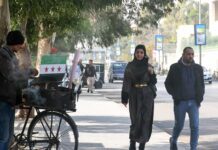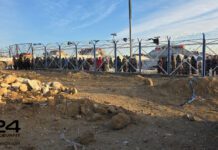
The Syrian Transitional Government (STG) pledged to pursue justice for the decades of atrocities committed under the Assad regime, including war crimes, crimes against humanity, and widespread abuses against civilians. As the country moves into a new era following the regime’s collapse, officials have promised to hold perpetrators accountable while fostering reconciliation for those not implicated in violence.
The leader of the Command of Military Operations (CMO), Ahmad al-Sharaa, reaffirmed this commitment earlier this week, emphasizing the need for justice while balancing accountability with tolerance. “We will not hesitate to hold accountable the criminals, murderers, security, and army officers involved in torturing the Syrian people,” al-Sharaa told the press. He highlighted efforts to locate and extradite individuals who fled Syria to evade prosecution.
In a step toward transparency, he announced plans to release a list that will include the names of high-ranking officials responsible for torture and other crimes. The government will offer financial rewards to individuals who provide credible information on the whereabouts of these suspects.
“We will pursue war criminals and demand their extradition from the countries to which they fled so that they may receive their just punishment,” he promised. At the same time, the transitional leadership has granted amnesty to individuals who served in compulsory roles but did not participate in atrocities. “The blood of innocent martyrs and the rights of detainees are a trust that we will not allow to be wasted or forgotten,” he added.
The announcement coincided with the Syrian Civil Defense’s completion of its search for detainees in Sednaya Prison, a site infamous for its role in systematic torture and extrajudicial killings. No undiscovered cells or captives were found, but officials described the site as a haunting reminder of the regime’s brutal legacy.
The security forces face immense challenges, including the dismantling of what remains of the former regime’s criminal infrastructure. CMO commander al-Sharaa emphasized that the regime’s “pillars,” a group of approximately 2,000 senior officers, intelligence operatives, and figures implicated in corruption and violence, remain a key focus. He warned that these individuals could attempt to sabotage ongoing efforts to stabilize the country.
The STG has called on the international community to assist in bringing justice to Syria. The Syrian Network for Human Rights (SNHR) issued a statement urging Russia to reconsider its decision to grant asylum to former dictator Bashar al-Assad. The group argued that granting asylum to Assad contradicts international obligations to hold war criminals accountable.
Under the 1951 Refugee Convention, individuals accused of crimes against humanity are excluded from asylum protections. “Assad is responsible for killing over 202,000 civilians, including 15,000 who died under torture,” the network said. “It is essential that Assad be extradited to Syria for a fair trial under international standards.”
The Kremlin’s decision to offer Assad refuge on “humanitarian grounds” has drawn sharp criticism from human rights advocates. Kremlin spokesperson Dmitry Peskov confirmed that President Vladimir Putin personally approved the asylum offer, a move seen by many as a political gesture rather than a legal one.








